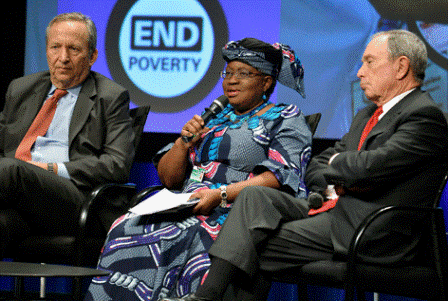
Investors in Nigeria are so far unfazed by the wave of killings and kidnappings by Islamist militants that have rocked Africa’s largest oil producer and sparked international outrage.
As the U.S. prepares to send security personnel to help Nigerian authorities find and rescue more than 200 schoolgirls kidnapped by Islamist militants in the country’s northeast, delegates arriving at today’s World Economic Forum in the capital, Abuja, are still focused on tapping the continent’s oil reserves in the south and a growing middle class.
“It’s grabbing the attention of everybody globally, but it doesn’t give investors in Africa a surprise,” Teresa Coelho, a money manager at BPI Gestao de Activos SA, an owner of Nigerian stocks, said by phone from Lisbon. “It doesn’t change the investment case.”
Executives from Heineken NV (HEIA) to UBS AG (UBSN) are arriving in Nigeria as Africa’s biggest oil producer faces one of the worst rounds of violence in the capital in recent history. More than 90 people have been killed in separate bomb attacks in the past month just miles from where the conference is taking place. Gunmen on April 14 raided dormitories in an all-girls secondary school in remote Chibok in northeastern Borno state and drove off in trucks with more than 200 students.
Those incidents and others carried out by the Islamist militant group Boko Haram have been mainly confined to the north of the country and as long as that remains the case, money will keep flowing into the country, said Kevin Daly, who helps oversee about $12 billion in emerging-market and Nigerian debt for Aberdeen Asset Management. (ADN)
Most Populous
“If this were to spread to other parts of Abuja and to Lagos, which is obviously getting closer to the oil infrastructure, that’s where you start to have some potential impact on investor sentiment,” Daly said in a phone interview from London.
Companies such as Procter & Gamble Co. (PG) and MTN Group (MTN) Ltd., Africa’s biggest mobile-phone operator, have invested in Nigeria to tap Africa’s most populous nation of about 170 million people and the biggest economy that the government says will expand 6.75 percent this year. Foreign direct investment rose 28 percent to $21.3 billion last year, and stood at $2.5 billion in the first two months of 2014, according to the statistics office.
Investor Concern
“Recent bomb attacks in Abuja will strengthen existing concerns among investors about the state of security in Nigeria ahead of elections, even if they do not undermine the long-term investment case for Nigeria,” Alan Cameron, an economist at FCMB Group Plc in London, said in e-mailed response to questions.
The naira has weakened 0.8 percent against the dollar since the start of the year to trade at 161.55 as of 8.25 a.m. in Lagos today. Yields on Nigerian Eurobonds due July 2023 dropped 36 basis points in 2014 to 5.56 percent. The Nigerian Stock Exchange All-Share Index retreated 6.9 percent this year, the worst in Africa among 93 global indexes tracked by Bloomberg.
President Goodluck Jonathan said yesterday he accepted an offer from the U.S. to send “security personnel and assets” to assist Nigeria with helping locate the abducted girls. His administration has also deployed more than 6,000 security personnel for the WEF conference and closed some government offices and all schools in Abuja for the rest of the week.
Insurgent Capacity
Though Jonathan and his military chiefs have repeatedly claimed successes against the insurgents, Boko Haram has not lost its capacity to mount attacks, especially in the northeast, said Bola Tinubu, a member of Nigeria’s opposition All Progressives Congress and a former governor of Lagos.
“Government policy has failed to contain, much less eliminate, the terrorism scourge,” he said in an e-mailed response to questions. Boko Haram’s threat “has economic, political and social dimensions that government ignores at our collective national peril,” he said.
The five-year insurgency in the north by Boko Haram has claimed more than 4,000 lives and forced almost half a million people to flee their homes, according to the Brussels-based International Crisis Group. Boko Haram’s name means “western education is a sin” and the group has been waging a violent campaign to impose Shariah, or Islamic law, in Nigeria.
‘Underlying Strength’
Presidential spokesman Reuben Abati and Finance Ministry spokesman Paul Nwabuikwu didn’t respond to requests for comment.
Finance Minister Ngozi Okonjo-Iweala said in an interview on May 5 that investors will look beyond the Abuja bombings to the “underlying strength of this economy in the long term.”
“People are looking at Nigeria saying: OK, we know they will get on top of this problem, and we are not going to hang back, we are going to come, and we are going to invest, and we are going to look,” she said.
The statistics agency on April 6 revised its data to increase Nigeria’s gross domestic product by more than three-quarters to 80 trillion naira ($497 billion) for 2013, catapulting it ahead of South Africa as the continent’s biggest.
Nigeria depends on crude exports for about 70 percent of government revenue and 95 percent of export income. Oil companies have stayed in Nigeria through a civil war, military coups and an insurgency in the Niger River delta that cut oil production by 28 percent from 2006-2008.

